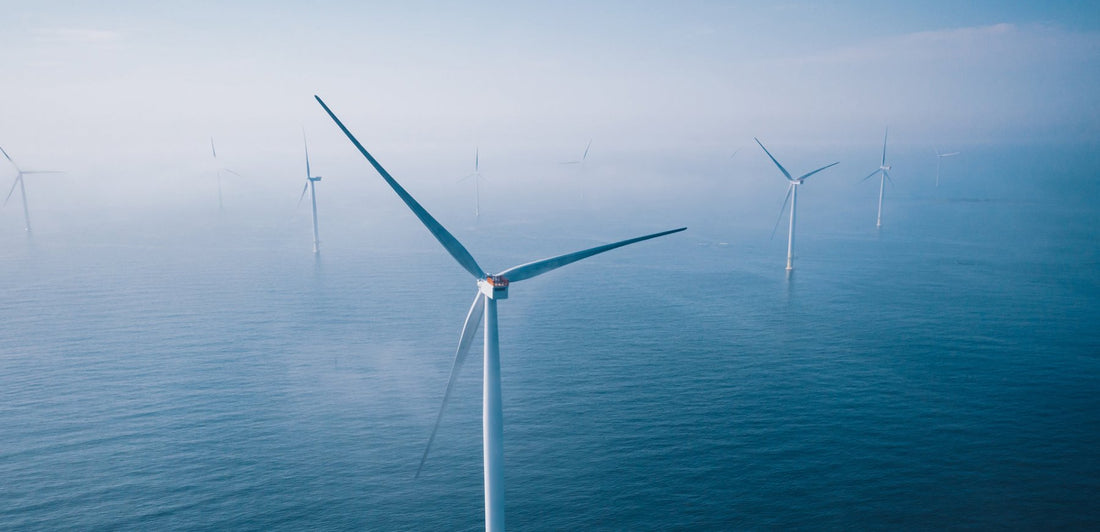Portugal kicked off the month of November by reaching an incredible milestone: powering the entire country for six consecutive days using nothing but renewable energy.
Thanks to favourable weather conditions that benefitted the country’s wind, solar and hydro infrastructure, records tumbled. The first of these was the amount of power generated, with renewable energy sources exceeding Portugal’s needs, meaning it could sell excess electricity to their Spanish neighbours. The second record set was the number of hours (131) that the Portuguese grid ran without any need for top-ups from gas power stations.
What does all this have to do with a sustainable fashion brand like TWOTHIRDS? Well, we make all our clothes locally in Europe, the vast majority crafted in Portugal, meaning that any sustainable jackets or eco-friendly knits that were manufactured by our trusted Portuguese partners during that time will have been made with a massively reduced carbon footprint.
“We make all our clothes locally in Europe, the vast majority crafted in Portugal.”
Another Reason To Keep Production Local
Here at TWOTHIRDS we are always at pains to point out just how important local production is when it comes to making clothes in both a sustainable and ethical way. Lots is often made about how crafting clothes in Europe discourages the exploitation of workers in Asia, but little is said about the carbon footprints of the production facilities those workers operate in. For this reason it is useful to compare the energy mixes and energy consumption trends of some of the world’s biggest textile manufacturing countries:
Vietnam 1990-2020 (image IEA):

Bangladesh 1990-2020 (image IEA):

Turkey 1990-2021 (image IEA):

Portugal 1990-2021 (Image IEA):

What Does The Data Show?
What these graphs show is that in developing countries such as Turkey, Bangladesh and Vietnam the use of fossil fuels is growing, especially high polluting fuels like coal. In Portugal things are trending in the opposite direction, with coal almost entirely phased out and the country’s reliance on gas and oil slowly diminishing.
We shouldn’t, however, get too ahead of ourselves. Portugal was only able to power itself on renewables for six consecutive days because weather conditions aligned. The graph above clearly shows that the country still has a long way to go to fully phase out harmful fossil fuel usage.
“We are doubling down on our efforts to keep production local in Portugal and Spain, where waves, wind and the beating sun have the power to fuel a cleaner future.”
What is clear, though, is that choosing to produce clothing in a country that heavily invests in renewable energy can only lead to the reduction of a sustainable clothing range’s environmental footprint. This is just one of the reasons we are doubling down on our efforts to keep production local in Portugal and Spain, where waves, wind and the beating sun have the power to fuel a cleaner future.
Lower Priced Green Energy = Lower Clothing Prices
Aside from the clear environmental benefits of crafting sustainable clothing in Portugal, there are also economical kickbacks for our customers, in the form of savings passed on to them by suppliers and brands whose green energy is far cheaper than energy generated by fossil fuels.
During this six day period, energy bills across Portugal were slashed to almost zero. As renewable energy capacity increases, such savings are sure to grow, savings which will then be passed on to TWOTHIRDS customers. The same cannot be said in other countries, where energy grids rely on fossil fuel infrastructure which is prone to disruption and major price hikes.
TWOTHIRDS Provides Support For Factories To Go Green
Far from sitting back and benefitting from the advances made by the Portuguese grid, here at TWOTHIRDS we also actively look to do our part to accelerate the green energy revolution. We do this by working hand-in-hand with our suppliers to ensure they generate their own green energy. In the past we have encouraged and financially supported suppliers to install solar panels on their factories, further reducing their reliance on gas fired power stations. Moving forward, we are prioritising business with suppliers that run using 100%, or close to 100%, renewable energy. After all, this is one of the quickest ways for us to reduce the environmental footprint of our sustainable clothing.

Still Much Work To Be Done
While we are understandably upbeat about the sustainability credentials of our Portuguese suppliers and partners, it is important to state that there is more work to be done to make TWOTHIRDS clothing climate neutral.
The same goes for the farming and sourcing of raw materials like organic cotton (53% of TWOTHIRDS clothing was made from organic cotton in 2022) a part of the supply chain which must enact substantial carbon emission and water usage reductions.








